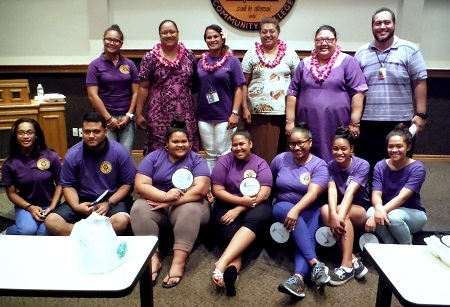
Members of the ASCC Psychology Club are seen here with the guest speakers at last week's Domestic Violence Awareness Forum. The Psychology Club co-sponsored the event along with the Social Science Department. (Photo: J. Kneubuhl)

Members of the ASCC Psychology Club are seen here with the guest speakers at last week's Domestic Violence Awareness Forum. The Psychology Club co-sponsored the event along with the Social Science Department. (Photo: J. Kneubuhl)
ASCC Hosts Domestic Violence Awareness Forum
October 25, 2016
By James Kneubuhl, ASCC Press Officer
In observance of Domestic Violence Awareness Month, the Social Science Department and the Psychology Club at the American Samoa Community College (ASCC) sponsored a Domestic Violence Awareness Forum on Friday, October 21. Following the precedent set by the first Domestic Violence Awareness Forum a year ago, guest speakers from the Department of Human and Social Services (DHSS), the Alliance for Strengthening Families, Veterans Affairs and the American Samoa Legal Aid Society all offered perspectives on domestic violence in the Territory, shared information on assistance available to victims, and answered questions from students.
Mrs. Judy Matautia from the Alliance for Strengthening Families took the podium first, and explained how a significant part of the Alliance’s mission is intervention strategies and activities to lessen the violence that can stem from within families. The Alliance, a non-profit organization, works in collaboration with all of the Territory’s service providers to promote healthy family relationships and refer domestic violence victims to the appropriate community agencies for help. Because services provided to the public often change depending on resources, the Alliance sponsors the Moso’oi Resource Network, which meets weekly to give service providers and other specialists the opportunity to increase awareness of their activities.
Mr. Robert Toelupe, Counselor at the Veteran’s Center, spoke next. He shared that from his counseling experience he has observed that many adults face a challenge when processing emotions, particularly negative emotions. Most people, Mr. Toelupe explained, take a passive attitude towards their own feelings, until an unhealthy emotional buildup results in a sudden shift from passivity to aggression. He suggested that many individuals need to think about their own response to conflict and the resulting emotions, and follow a path of assertiveness (which is different from aggression), in which a balance is struck between respect for the feelings of others and respect for the individual’s own feelings. He also stated that adults frequently prioritize material success and outward appearance over genuine emotional well-being. “No success can compensate for failure in the home,” Mr. Toelupe reminded the audience.
Mrs. Mona Uli of the Alliance shared with the audience that US Surgeon General has designated domestic violence as the #1 health concern in the USA. With assistance from members of the ASCC Student Government Association, Mrs. Uli illuminated the many aspects of domestic violence, in which abuse can be physical, emotional, economic or psychological. Mrs. Uli’s talk set the stage for the next speaker, Mrs. Genevieve Young-Taele of DHSS, who described a new Intervention Program for Intimate Partner Violence she calls the “Amana’ia” Program. “Amana’ia” differs from previous intervention programs in that it emphasizes the rehabilitation of the perpetrator along with assistance for the victim. “For there to be a lasting solution to domestic violence, we need to change the mindset of its perpetrators,” said Mrs. Young-Taele.
Fainuulelei Falefatu Alailima Utu of the American Samoa Legal Aid Society provided the last discussion of the forum. He outlined some of the legal options available to victims of domestic violence, including a Civil Protection Order (CPO), which he described as particularly effective. A victim, explained Fainuulelei, can simply fill out a form describing the kind of protection he/she needs, and once the court approves the CPO, then a perpetrator can be arrested for violating it. “Many victims of domestic violence follow the criminal route,” he said, “but may not be aware that there is a civil route that can also guarantee them a high degree of safety.”
All of the speakers at the forum shared contact information with the audience. Given the many options available, victims of domestic violence or anyone seeking intervention for a violent or potentially violent situation is advised to first contact the Police. Next, victims can contact the DHSS Crisis Line at 699-4311. Also, anyone needing advice on their situation is welcome to call the Alliance Talk Line at 733-4334. The Domestic Violence Awareness Forum was co-sponsored by the ASCC Social Science Department and the Psychology Club, whose officers this semester are President Nairy Galemoa, Vice President Alice Tausaga, Secretary Maila Feleti, and Treasurer Sheila Ah-Foon.
